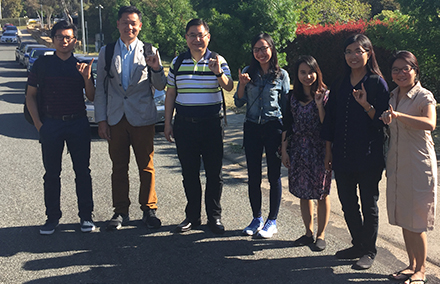Overseas voting reflects people’s enthusiasm and pride amid logistical pitfalls.While people inside Myanmar wait their turn to vote, overseas voting for the 2015 election has started.
Amid confusion over electoral rolls and even a last minute attempt to postpone the election itself, my overseas voting experience was still rewarding and echoes what we are about to see when Myanmar votes on 8 November.
Last Wednesday Myanmar citizens in Australia from as far away as Perth and Brisbane took their chances, flying in to Canberra still wondering whether their names would be on the electoral list at the Embassy.
Nine of us from the Australian National University went to the Embassy to vote as a group in the afternoon.
After casting our ballots, we had a group photo to show our thumbs inked in black as proof we had voted. It would become a social media post declaring ourselves as dutiful citizens.
It’s no secret that the 2015 election is more exciting than 2010 in all aspects. It’s more competitive, observer-friendly, and has received wider media and public attention both within Myanmar and abroad.
As someone who voted while overseas in 2010, I was really struck by people’s enthusiasm and their pride in exercising their democratic right this time around. But, their excitement was challenged by logistical realities.
Around July, the Embassy in Canberra announced to Myanmar citizens that they would need to submit a voters’ registration form, Form 15. It was a challenge for the embassy as well as for Myanmar citizens in Australia and it created confusion and misunderstanding.
First, it took time to spread the news. Direct communication was difficult because people rarely contact the Embassy unless it is absolutely necessary. Luckily, news did spread by word of mouth due to people’s interest in the vote. But by the time people sent in their Form 15, many of them had missed the deadline.
Second, the overseas voting date was set for somewhere between 13-18 October. But no one had any idea whether they were on the list of registered voters or not. With contentions over electoral rolls inside Myanmar, people started to treat the whole thing like a lucky draw. When the list was announced on 12 October, those on it reacted as if they had won something (some would say a historic right).
However, many names were not included creating widespread criticism. To make matters worse, because of time restraints the Union Electoral Commission sent a list of all 34,967 overseas voters to every mission overseas. In some cases the Foreign Ministry had to send its own staff as a diplomatic courier carrying ballot papers.
This made life extremely difficult for the 44 embassies and consulates around the globe when compiling the lists of voters in each country. Some people took the matter into their own hands by uploading the list to social media.

Chit Win (third from left) and fellow ANU students from Myanmar show their inked-stained thumbs.
But most importantly, the number of overseas voters who will get to participate is merely a fraction of the total of Myanmar citizens living abroad. The last census showed that Myanmar has over two million people living overseas; of them, less than 2 per cent will be heading to polling stations.
Most of these are Myanmar skilled workers in Singapore where 20,000 out of 150,000 have been registered to vote. In contrast, only 300 will vote in Thailand, which hosts more than a million migrant workers from Myanmar.
The same applies in Malaysia, where 500 out of its 300,000 migrants, mostly unskilled workers, will get to cast a ballot.
Overall, overseas voting has shed some light on the logistical challenges that Myanmar may experience on polling day inside the country.
People will be frustrated if they do not see their names on voting lists. Despite their strong commitment, bureaucrats will receive complaints for their incompetence. There could potentially be a lot of misunderstanding, leading to confusion and contention.
But, if we can take the lessons of overseas voting to heart, Myanmar still has a little more than three weeks to work out any ongoing issues.
If the country can rise to the challenge, the enthusiasm surrounding this historic ballot will not be undermined by logistical pitfalls. Most significantly, 2015 will truly be a vote for democracy, prosperity and peace in Myanmar.
Chit Win is a PhD student at the Coral Bell School of Asia Pacific Affairs at The Australian National University. His research focuses on the role of the legislature in Myanmar’s nascent transition.
This article forms part of New Mandala’s ‘Myanmar and the vote‘ series.
 Facebook
Facebook  Twitter
Twitter  Soundcloud
Soundcloud  Youtube
Youtube  Rss
Rss